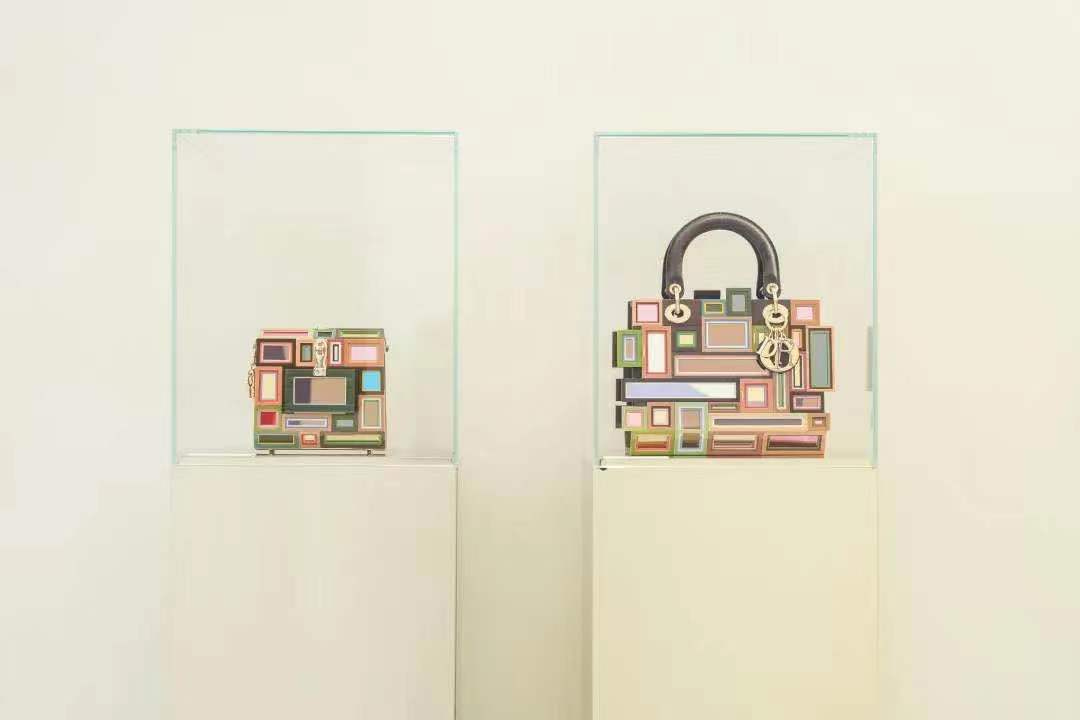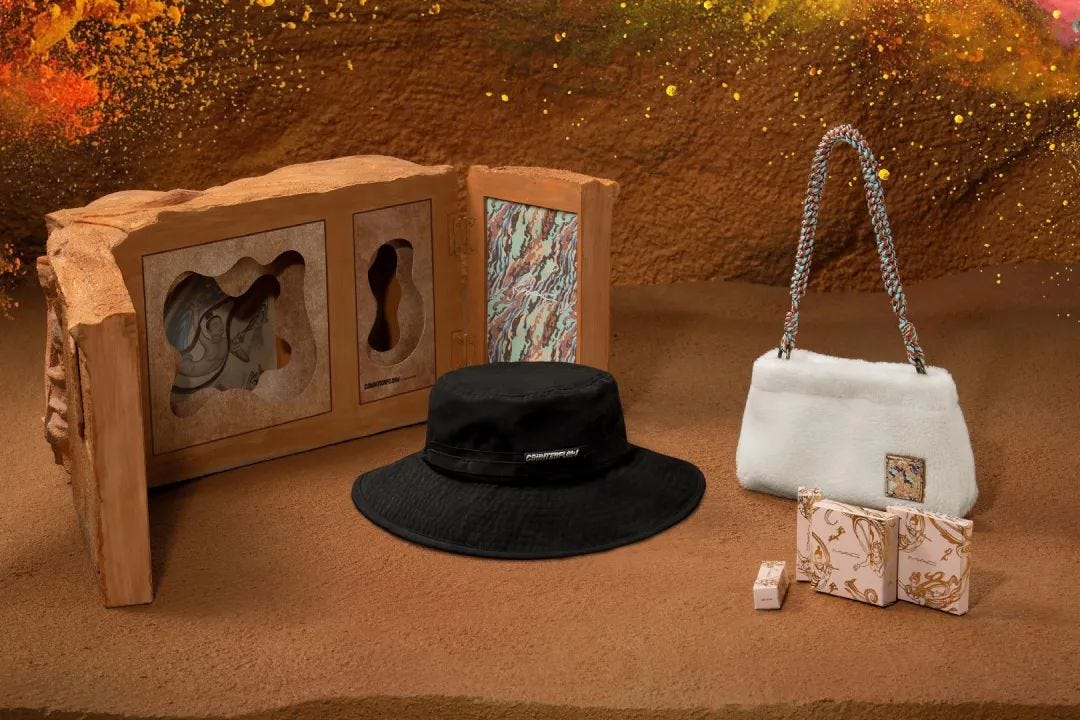Best of Brand Collaborations: November 2020
Plus: China's top luxury gets its own show, Burberry bangs the drums, and a turtle merchant cashes in.
The Content Commerce Insider newsletter highlights how brands create content to drive revenue. If you have received our newsletter from a friend or colleague, we hope you will subscribe as well and follow us on LinkedIn and Instagram.
China’s hyper-active collaborations scene has seen heightened competition over the course of 2020, as more brands are seeking out creative partnerships to drive product innovation that can help them stand out from the crowd. Activity was especially heated in the run-up to this year’s Singles’ Day, with limited-edition gift sets serving as a reliable way for brands to drive sales without resorting to discounts. Culturally-oriented collaborations continue to rise in popularity, bringing the arts to wider audiences and integrating seamlessly with their daily lives.
Top Pick: Metropolitan Museum of Art x Game for Peace
Collaborations between premium brands and games have been accelerating rapidly in China as marketers realize the vast potential of the country’s 500 million-plus players. Gaming is a mainstream pastime, and its fans span the consumer spectrum, including women and potential customers for luxury brands such as Louis Vuitton and Burberry and high-end autos from Mercedes-Benz and Tesla — all of which have been lining up to partner with the most popular games in the red-hot sector.
International cultural institutions are also sensing an opportunity to reach audiences for whom travel is not currently possible and engage them with arts appreciation through gaming. In what has been lauded as the first collaboration between a major global art institution and a top Chinese gaming IP, New York’s Metropolitan Museum of Art partnered with Game for Peace, Tencent’s Chinese mobile version of PlayersUnknown Battlegrounds, to showcase the iconic Fifth Avenue building and famed works from its collections as part of a limited-time “fantasy journey” mode in the game.
The immersive experience encourages players to get up close and explore the museum’s treasures, enhancing the cultural cachet of a game better known for militaristic fighting (though toned down in the Chinese version), and fits in with the broader trend of cultural collaborations that meet consumers in their everyday lives.
Five more noteworthy collaborations from November 2020:
Dior x Song Dong
The fifth edition of the Dior Lady Art collaboration series was unveiled as an exhibition during the Art021 Shanghai Contemporary Art Fair, with the spotlight in China on the brand’s collaboration with contemporary artist Song Dong. Song’s 2017 work Usefulness of Uselessness – Rectangular Window No. 9 was featured in the show and served as the inspiration for the artist’s handbag designs, which closely mimic the appearance of the original piece’s wooden traditional Chinese window frames to offer a wearable artwork.
Cartier x Eight Chinese Artists
A less product-centric approach was adopted by Cartier to appeal to Gen Z and millennial tastes in contemporary art and culture through its “Pasha De Cartier — Make Your Own Path” campaign to promote the return of the Pasha series of luxury watches. The campaign engaged eight young creatives, including photographer Zhang Jiacheng, paper designer Chen Fenwan, and graffiti artist Chen Yingjie to create pieces that were displayed around Shanghai and share their experiences of forging their own paths through their work.
McDonald’s x China Lunar Exploration Program x Chen Peng
Three-way “mega-collaborations” are emerging as another way for brands to distinguish themselves in the crowded collaboration space. With China’s latest mission to the moon making national headlines, McDonald’s was the latest brand to team up with the China Lunar Exploration Program for a collaboration, but this one went beyond the obvious (such as space-themed meals), adding designer Chen Peng to create a limited-edition capsule collection of co-branded products, including parent-child down jackets, “spaceship” hats, and “planet” bags.
MAC Cosmetics x Li Ning x Dunhuang Research Academy
Another tripartite partnership incorporated global beauty, domestic sportswear, and China’s cultural heritage in a limited-edition gift set for Singles’ Day. The packaging of the collaborative box replicates the appearance of famous Silk Road caves, opening to reveal colorful makeup cases inspired by the Dunhuang murals, along with a streetwear-style bucket hat and purse from Li Ning.
Moschino x Chun Zhen Yogurt
The Italian luxury fashion brand worked with Mengniu Dairy’s Chun Zhen brand to dress up bottles of the drinkable yogurt in colorful styles, “turning them into the supermodels of the supermarket,” according to Moschino Creative Director Jeremy Scott. The partnership also included a collectible teddy bear wearing a t-shirt that reads, “This is not your yogurt,” available via a special promotion on Tmall Black Box.
Mentioned in today’s newsletter: Alibaba, Bilibili, BMW, Burberry, Cartier, Coca-Cola, Dior, Douyin, Ink+Ivy, Li Ning, Louis Vuitton, MAC Cosmetics, McDonald’s, Mengniu, Mercedes-Benz, Moschino, Shang Xia, Taobao Live, Tencent, Tesla, Voss, Youku.
Alibaba and Youku Promote China’s Greatest Luxury: A Good Night’s Sleep
by Avery Booker
With consumers spending far more time at home in 2020, in China sports and health and wellness brands, personal trainers, and even doctors quickly pivoted to content-commerce mainstays like livestreaming in the first half of the year to reach the large share of the population that was kept home for an extended period, and—once restrictions were lifted—often preferred to do yoga or speak to a GP in the comfort of their own home.
But even as life in China has returned to a new normal, one thing that has remained a problem for hundreds of millions—both before and after the peak of Covid-19—has been stress-fueled sleep deprivation, a health emergency in China and worldwide. According to the CDC, not getting enough sleep is linked to many chronic diseases and conditions, including type 2 diabetes, heart disease, obesity, and depression. And in China, sleep deprivation has become a national concern in recent years, with a recent study by the Chinese Sleep Research Society finding that around 300 million people (nearly a quarter of the population) struggle with sleep disorders, and 94% of the population does not meet the recommended health standard for quality of sleep.
This, of course, means lots of sleep-deprived people and potential consumers of supplements, apps, and sleep-related gizmos, and e-commerce sellers and platforms have been quick to capitalize on the demand. By 2017, China’s sleep aid market was valued at RMB 280 billion ($42.7 billion), with the vast majority of that made up of sleep monitoring and assisting devices. During last year’s 618 Shopping Festival, Tmall reported a 530% increase in sales of sleep-related items, led by melatonin supplements, essential oils, bedding, and blackout eye masks.
Catering to this vast market of sleep-deprived consumers, Alibaba Health (阿里健康) recently took a page from its parent company’s expansive content-commerce playbook with the rollout of an eight-episode reality program on Youku, the Alibaba-owned video streaming platform. The show, called “Sleep Tight” (睡有好眠), aims at “saving [audiences] from every sleepless night,” and looks into the lives and sleep quality (or lack thereof) of stressed-out representatives from eight key groups, including new mothers, working women, IT workers, newlyweds, middle-aged people, and digital creatives.
Read the full article on Content Commerce Insider
Brand Film Pick: Burberry’s Generation Represents Chinese Youth
The 164-year-old British luxury house Burberry has become one of the most digitally savvy global fashion brands in the Chinese market, targeting young consumers through innovations in mobile gaming, an ambitious social retail partnership with Tencent, and a hotly anticipated collaboration with the blockbuster game “Honor of Kings.”
Burberry also uses branded film to engage in storytelling to engage Chinese millennials and Gen Z consumers, such as sharing the craftsmanship behind each of its signature trench coats. A more direct effort to speak to Chinese youth is seen in its newly launched “Burberry Generation” (Burberry博界) campaign that celebrates creative talent across genre. The first part took photography as its medium, showcasing the Olympia handbag through the lens of five young Chinese photographers.
The second installment of the campaign shines the spotlight on indie rock drummers, out in the woods instead of their usual habitats of studios and stages. Shi Lu of Hedgehog, Yang Yuhao of Penicillin, and Ju Yiming, a recent contestant on the music competition show “The Coming One” (明日之子), each take turns playing and sharing what music means to them as they sport Burberry’s Arthur sneaker along with clothing and accessories from the brand.
The campaign has been well received, with more than 2 million views for its Weibo hashtag, and related social media campaigns offered fans the opportunity to win posters and autographed drumsticks from the musicians.
News From China
Brand integration on Chinese dramas in November: Sponsors continue to shy away from supporting scripted shows across the board. According to Starlink, only 11 of the 41 dramas that premiered in November had brand sponsors.
Not too surprisingly, “Something Just Like This” (青春创世纪), an adaptation of a popular online novel that revolves around the business of e-commerce livestreaming, had the deepest involvement, with 12 brand sponsors, including Coca-Cola, Voss water, and Ink+Ivy bedding. It’s rare to see several international brands on one series, but the combination of established IP, the rise of e-commerce livestreaming, and privileged characters would be a draw for aspirational audiences.
Pet livestreaming: Selling pets via live broadcasts is a thing now.
Turtle seller Zhang Jing was recently featured as one of Taobao Live’s 108 “Kung Fu Anchors,” with annual sales of more than RMB 20 million ($3 million). Given the rise in pet ownership and pampering, along with the popularity of top livestreamer Li Jiaqi’s dog Never on his broadcasts or this American Akita chomping on raw meat on Douyin, it’s only a matter of time before we see more pets before the cameras.
Socialbeta compiled a year-end list of 10 top brands across various categories, including BMW for “most youthful” (thanks in part to its recent debut on Bilibili and the earlier appointment of Jackson Yee as brand ambassador), Burberry for most digitally innovative (see this week’s brand film pick above), and McDonald’s for the cuteness quotient of its marketing campaigns.
News in English
Antitrust fine for Alibaba and Tencent’s China Literature: The two companies were sanctioned for failing to obtain clearance for previous deals in part of a broader anti-monopoly campaign targeting China’s biggest tech firms. Techcrunch
The game livestreaming merger between the two biggest platforms, Huya and Douyu, is also coming under scrutiny as Tencent is a major backer of both. Bloomberg
And what Beijing is trying to change with an overhaul to anti-monopoly rules. KrAsia
Ferrari’s parent company, Exor, is taking a controlling stake in Hermès China-specific luxury brand Shang Xia. WWD
A look at key trends for the beauty sector from this year’s Singles’ Day, where skin care and cosmetics rank among the top-selling products. Coresight Research
And while Singles’ Day is the main event for shopping in China in November, Black Friday was also promoted via Tmall Global, an Amazon partnership with Baidu, and Pinduoduo’s livestreaming from bonded warehouses. Azoya
From luxury’s adoption of livestreaming to the next wave of live sales broadcasts for autos and real estate, Gartner’s Danielle Bailey shares insights for global brands from the 2020 Singles’ Day. Alizila
Though inaccessible in China without a VPN, Instagram remains popular among a certain segment of wealthy shoppers who have used the platform overseas. SCMP
Top Kuaishou livestreamer Xinba agreed to pay triple damages in compensation to consumers who bought fake bird’s nest during a November broadcast, the latest high-profile scandal involving e-commerce broadcasts. Dao Insights
Starbucks plans to add another 600 stores in China to its current total of roughly 4.400, with an emphasis on pick-up-focused Starbucks Now outlets. Caixin
We’ve Got China Covered
China Film Insider: Socially Dead Laborers of Versailles: China’s 2020 in Memes
Jing Daily: Why Luxury Prices Start With Branded Experiences
Jing Culture & Commerce: How Museums Can Benefit From Partnerships in 2021













